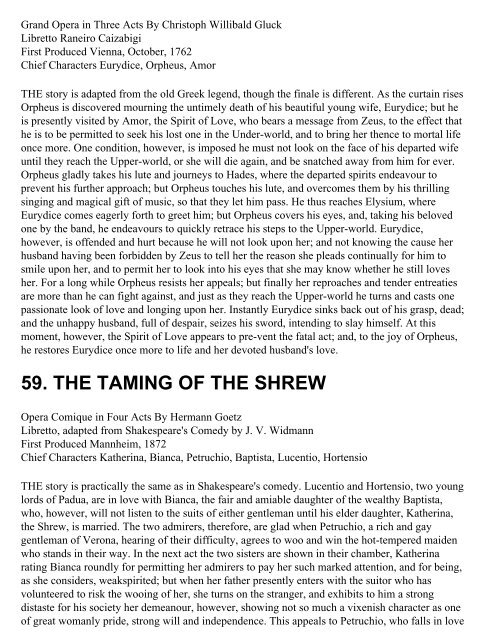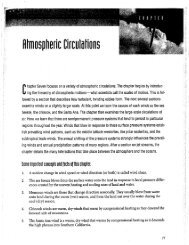Opera Plots I - MDC Faculty Home Pages
Opera Plots I - MDC Faculty Home Pages
Opera Plots I - MDC Faculty Home Pages
Create successful ePaper yourself
Turn your PDF publications into a flip-book with our unique Google optimized e-Paper software.
Grand <strong>Opera</strong> in Three Acts By Christoph Willibald Gluck<br />
Libretto Raneiro Caizabigi<br />
First Produced Vienna, October, 1762<br />
Chief Characters Eurydice, Orpheus, Amor<br />
THE story is adapted from the old Greek legend, though the finale is different. As the curtain rises<br />
Orpheus is discovered mourning the untimely death of his beautiful young wife, Eurydice; but he<br />
is presently visited by Amor, the Spirit of Love, who bears a message from Zeus, to the effect that<br />
he is to be permitted to seek his lost one in the Under-world, and to bring her thence to mortal life<br />
once more. One condition, however, is imposed he must not look on the face of his departed wife<br />
until they reach the Upper-world, or she will die again, and be snatched away from him for ever.<br />
Orpheus gladly takes his lute and journeys to Hades, where the departed spirits endeavour to<br />
prevent his further approach; but Orpheus touches his lute, and overcomes them by his thrilling<br />
singing and magical gift of music, so that they let him pass. He thus reaches Elysium, where<br />
Eurydice comes eagerly forth to greet him; but Orpheus covers his eyes, and, taking his beloved<br />
one by the band, he endeavours to quickly retrace his steps to the Upper-world. Eurydice,<br />
however, is offended and hurt because he will not look upon her; and not knowing the cause her<br />
husband having been forbidden by Zeus to tell her the reason she pleads continually for him to<br />
smile upon her, and to permit her to look into his eyes that she may know whether he still loves<br />
her. For a long while Orpheus resists her appeals; but finally her reproaches and tender entreaties<br />
are more than he can fight against, and just as they reach the Upper-world he turns and casts one<br />
passionate look of love and longing upon her. Instantly Eurydice sinks back out of his grasp, dead;<br />
and the unhappy husband, full of despair, seizes his sword, intending to slay himself. At this<br />
moment, however, the Spirit of Love appears to pre-vent the fatal act; and, to the joy of Orpheus,<br />
he restores Eurydice once more to life and her devoted husband's love.<br />
59. THE TAMING OF THE SHREW<br />
<strong>Opera</strong> Comique in Four Acts By Hermann Goetz<br />
Libretto, adapted from Shakespeare's Comedy by J. V. Widmann<br />
First Produced Mannheim, 1872<br />
Chief Characters Katherina, Bianca, Petruchio, Baptista, Lucentio, Hortensio<br />
THE story is practically the same as in Shakespeare's comedy. Lucentio and Hortensio, two young<br />
lords of Padua, are in love with Bianca, the fair and amiable daughter of the wealthy Baptista,<br />
who, however, will not listen to the suits of either gentleman until his elder daughter, Katherina,<br />
the Shrew, is married. The two admirers, therefore, are glad when Petruchio, a rich and gay<br />
gentleman of Verona, hearing of their difficulty, agrees to woo and win the hot-tempered maiden<br />
who stands in their way. In the next act the two sisters are shown in their chamber, Katherina<br />
rating Bianca roundly for permitting her admirers to pay her such marked attention, and for being,<br />
as she considers, weakspirited; but when her father presently enters with the suitor who has<br />
volunteered to risk the wooing of her, she turns on the stranger, and exhibits to him a strong<br />
distaste for his society her demeanour, however, showing not so much a vixenish character as one<br />
of great womanly pride, strong will and independence. This appeals to Petruchio, who falls in love













